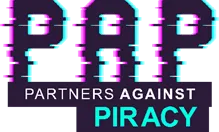Urgent reforms needed to protect South Africa's creative industry from piracy

Partners Against Piracy calls for stronger legislation to protect creatives and bring offenders to justice.
Image: Supplied
Piracy is costing South Africa’s creative economy jobs, investment, and cultural output, according to Chola Makgamathe, chairperson of the Copyright Coalition of South Africa and Partners Against Piracy (PAP).
At MIP Africa’s FAME Week in Cape Town, Makgamathe urged consumers and intermediaries to play their part in stopping the spread of pirated sports, music, film, and publishing content.
“Piracy is not a victimless hack. It is pay cheques that never arrive, crews that never get booked, and stories that never get made,” Makgamathe said.
“If we want a thriving creative economy, three things must move together. First, informed consumers who choose legal platforms. Second, intermediaries that act quickly on takedown requests. Third, modern legislation that lets enforcement move at the speed of the internet. When those pieces click, we protect jobs and we protect our culture.”
PAP’s industry panel, moderated by MultiChoice executive Waldimar Pelser, drew a strong audience.
The panellists included Makgamathe, author and content director Janine Jellars, SuperSport’s Executive Head of Legal Shane Wafer, and Irdeto Southern Africa’s Anti-Piracy Manager Edward Mnisi.
They painted a stark picture of how piracy has exploded in the digital era. Music remains especially vulnerable, with 17.1 billion visits to piracy sites in 2023 alone, up by 13.4% from the previous year.
Television piracy accounts for more than 45% of illegal traffic, while entire books are routinely uploaded and downloaded without authors being paid.
The panel flagged systemic gaps, including South Africa’s lack of a modern notice-and-takedown mechanism.
Current copyright law, designed for the analogue era, struggles to address IPTV, streaming platforms, and AI-driven content replication.
Wafer explained SuperSport’s approach of targeting distributors rather than end-users, while Mnisi outlined how forensic watermarking and internet trawling are used to shut down pirate feeds.
Education was another key theme. The panel urged awareness drives in schools and communities to show that “free” often means “stolen”.
They also called for closer collaboration between government departments, from Justice to Communications, to ensure enforcement keeps pace with technology.
To bring the issue to life for the public, PAP launched an interactive “Piracy Maze” at CTICC 2, where visitors can explore the impact of piracy on books, music, gaming, and video.
While industry leaders debated systemic reform, police made a breakthrough case highlighting how piracy operates on the ground.
Earlier this year, in February, detectives from the Commercial Crime Unit, working with Irdeto South Africa, arrested a police sergeant stationed at Durbanville SAPS.
The 49-year-old officer was allegedly reselling WAKA TV logins, giving unauthorised access to channels, including DStv.
Detectives executed a search warrant at a Berlios Street property in Paarl, seizing a cellphone and a laptop as evidence. The suspect is expected to appear in the Paarl Magistrate’s Court soon.
Western Cape Provincial Commissioner, Lieutenant General Thembisile Patekile, previously issued a stern warning: “We expect our members to uphold the law, not break it. Any officer found aiding criminal networks will face the full consequences.”
mandilakhe.tshwete@inl.co.za
Related Topics: